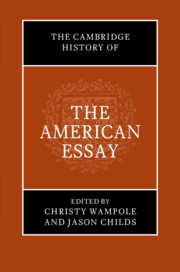Book contents
- The Cambridge History of the American Essay
- The Cambridge History of the American Essay
- Copyright page
- Contents
- Acknowledgments
- Notes on Contributors
- Introduction
- Part I The Emergence of the American Essay (1710–1865)
- 1 Essays to Do Good: Puritanism and the Birth of the American Essay
- 2 Prattlers, Meddlers, Bachelors, Busy-Bodies: The Periodical Essay in the Eighteenth Century
- 3 The Federalist and the Founders
- 4 American Nature Writing: 1700–1900
- 5 The Essay and Transcendentalism
- 6 Old World Shadows in the New: Europe and the Nineteenth-Century American Essay
- 7 Poet-Essayists and Magazine Culture in the Nineteenth Century
- 8 Antebellum Women Essayists
- Part II Voicing the American Experiment (1865–1945)
- Part III Postwar Essays and Essayism (1945–2000)
- Part IV Toward the Contemporary American Essay (2000–2020)
- Recommendations for Further Reading
- Index
4 - American Nature Writing: 1700–1900
from Part I - The Emergence of the American Essay (1710–1865)
Published online by Cambridge University Press: 28 March 2024
- The Cambridge History of the American Essay
- The Cambridge History of the American Essay
- Copyright page
- Contents
- Acknowledgments
- Notes on Contributors
- Introduction
- Part I The Emergence of the American Essay (1710–1865)
- 1 Essays to Do Good: Puritanism and the Birth of the American Essay
- 2 Prattlers, Meddlers, Bachelors, Busy-Bodies: The Periodical Essay in the Eighteenth Century
- 3 The Federalist and the Founders
- 4 American Nature Writing: 1700–1900
- 5 The Essay and Transcendentalism
- 6 Old World Shadows in the New: Europe and the Nineteenth-Century American Essay
- 7 Poet-Essayists and Magazine Culture in the Nineteenth Century
- 8 Antebellum Women Essayists
- Part II Voicing the American Experiment (1865–1945)
- Part III Postwar Essays and Essayism (1945–2000)
- Part IV Toward the Contemporary American Essay (2000–2020)
- Recommendations for Further Reading
- Index
Summary
With a focus on the eighteenth and nineteenth centuries, this chapter recounts the history of American nature writing in its many iterations. Like the essay in general, nature writing is a hybrid form. It is omnivorous, incorporating elements of travel writing, natural philosophy, ethnography, diarism, and epistolary writing. Nature writing of the period in question is filled with technical information on plants and animals, agricultural practices, and methods for hunting or navigating, but it also abounds with metaphysical speculations, theological pronouncements, elaborate landscape descriptions, and dramatic accounts of practices like hiking, camping, fishing, and farming. Authors of many of the most well-known essays had professional ties to disciplines like geology, botany, and forestry. Featured essayists in this chapter include St. John de Crèvecoeur, Meriwether Lewis, John Wesley Powell, John Muir, Susan Fenimore Cooper, Henry David Thoreau, and John James Audubon, among others.
Keywords
- Type
- Chapter
- Information
- The Cambridge History of the American Essay , pp. 61 - 80Publisher: Cambridge University PressPrint publication year: 2023

